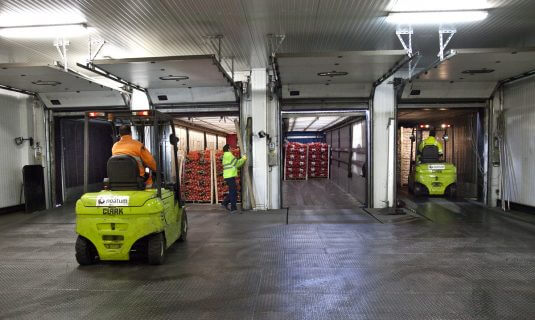The Port of Bilbao and Mercabilbao will be present once again at Fruit Logistica, the main European fruit and vegetables exhibition, which will be held from 7-9 February in Berlin.
Both entities will be at the Spanish State Ports stand (Pavilion 23, Nº E-05) where they will show their competitive advantages for becoming the entry gate for traffic from South and Central America and their capability to reship fruit and vegetables to Europe and the rest of the Iberian Peninsula. Without doubt it is an alternative to transporting horticultural produce by road, and a bid for Bilbao to establish itself as a horticultural food produce hub importer and exporter in Spain.
So, both infrastructures boast cutting edge facilities that are completed with a large number of maritime services connecting Bilbao with some 900 ports worldwide.
In 2017, fruit and vegetables traffic in the Port of Bilbao rose to 136,000 tonnes. Outstanding produce was vegetables as well as onions, garlic, potatoes and citrus fruits.
Exports were dominated by the United Kingdom, Ireland, Sweden and Canada, while imports from the United Kingdom, Peru, India, Chile and the Netherlands stood out.
Smoother operations with the new, automatic access system.
Bilbao has the most important container terminal in the north of Spain which is also the one with the greatest drafts. It is managed by Noatum Container Terminal Bilbao and has 540 plug sockets for reefer containers whose temperatures are controlled and monitored 24 hours a day, 365 days a year. The terminal also carries out cross docking in an area specially adapted for this service. In addition, rail-transported refrigerated goods containers are received at the facilities where there is a terminal with four 450-metre tracks, which will be extended to 550 metres.
Recently, Noatum Container Terminal Bilbao and the Port Authority have defined an automatic access procedure at the new container terminal gates which came into service last September and which makes operations smoother and simpler, including those for fresh produce hauliers.

Furthermore, the Port boasts a perishable goods terminal (Frioport) which has a 25,000 cubic metre capacity, equivalent to 5000 tonnes of produce. Different storage modules enable fresh and refrigerated goods to be conserved at temperatures ranging from +12° to -5°C and frozen at up to -22°.
There are also private warehouses like those belonging to Progeco Bilbao, which has 12 bays – some 800m²- dedicated to cross-docking, for the transfer of perishable goods at controlled temperatures from refrigerated trucks to containers. For fruits and vegetables entering from South America and Africa, the Port of Bilbao has a Border Inspection Post with 16 unloading bays.
The Port’s maritime links are complemented with its smoothness in procedures and intermodal rail services with Vitoria, Burgos, Madrid, Guadalajara, Seville, Zaragoza, Navarre, Barcelona, Castellon, Valencia and Murcia. The latter, departing from Nonduermas, offers a regular refrigerated trains service.
About Mercabilbao
Mercabilbao enjoys a strategic position very close to the intersection of the Paris-Hendaye-Madrid axis next to the Cantabrian Motorway, and a direct link with the national motorways network. Together with the Port of Bilbao, it is ideally situated to carry out an effective and quality internationalisation strategy, which is a competitive advantage for horticultural sector operators, both from the point of view of resources, economics, time, available infrastructures as well as existing logistics storage. In 2017, 219 million tonnes of fruit and vegetables were handled at the Mercabilbao facilities.

 Port access
Port access